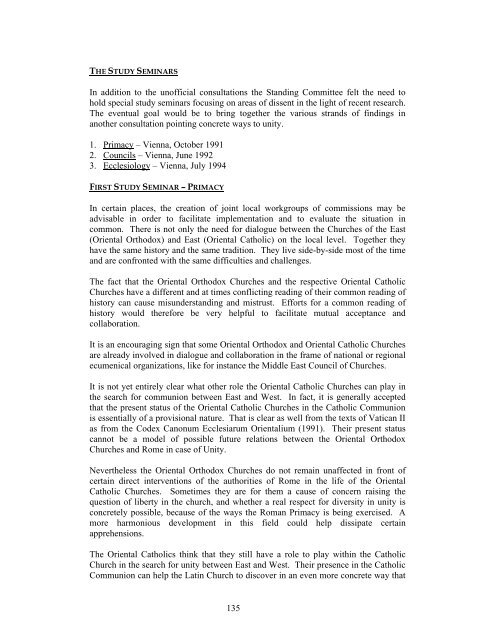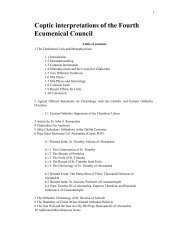Coptic Church & Ecumenical Movement - Saint Mina Coptic ...
Coptic Church & Ecumenical Movement - Saint Mina Coptic ...
Coptic Church & Ecumenical Movement - Saint Mina Coptic ...
You also want an ePaper? Increase the reach of your titles
YUMPU automatically turns print PDFs into web optimized ePapers that Google loves.
THE STUDY SEMINARS<br />
In addition to the unofficial consultations the Standing Committee felt the need to<br />
hold special study seminars focusing on areas of dissent in the light of recent research.<br />
The eventual goal would be to bring together the various strands of findings in<br />
another consultation pointing concrete ways to unity.<br />
1. Primacy – Vienna, October 1991<br />
2. Councils – Vienna, June 1992<br />
3. Ecclesiology – Vienna, July 1994<br />
FIRST STUDY SEMINAR – PRIMACY<br />
In certain places, the creation of joint local workgroups of commissions may be<br />
advisable in order to facilitate implementation and to evaluate the situation in<br />
common. There is not only the need for dialogue between the <strong>Church</strong>es of the East<br />
(Oriental Orthodox) and East (Oriental Catholic) on the local level. Together they<br />
have the same history and the same tradition. They live side-by-side most of the time<br />
and are confronted with the same difficulties and challenges.<br />
The fact that the Oriental Orthodox <strong>Church</strong>es and the respective Oriental Catholic<br />
<strong>Church</strong>es have a different and at times conflicting reading of their common reading of<br />
history can cause misunderstanding and mistrust. Efforts for a common reading of<br />
history would therefore be very helpful to facilitate mutual acceptance and<br />
collaboration.<br />
It is an encouraging sign that some Oriental Orthodox and Oriental Catholic <strong>Church</strong>es<br />
are already involved in dialogue and collaboration in the frame of national or regional<br />
ecumenical organizations, like for instance the Middle East Council of <strong>Church</strong>es.<br />
It is not yet entirely clear what other role the Oriental Catholic <strong>Church</strong>es can play in<br />
the search for communion between East and West. In fact, it is generally accepted<br />
that the present status of the Oriental Catholic <strong>Church</strong>es in the Catholic Communion<br />
is essentially of a provisional nature. That is clear as well from the texts of Vatican II<br />
as from the Codex Canonum Ecclesiarum Orientalium (1991). Their present status<br />
cannot be a model of possible future relations between the Oriental Orthodox<br />
<strong>Church</strong>es and Rome in case of Unity.<br />
Nevertheless the Oriental Orthodox <strong>Church</strong>es do not remain unaffected in front of<br />
certain direct interventions of the authorities of Rome in the life of the Oriental<br />
Catholic <strong>Church</strong>es. Sometimes they are for them a cause of concern raising the<br />
question of liberty in the church, and whether a real respect for diversity in unity is<br />
concretely possible, because of the ways the Roman Primacy is being exercised. A<br />
more harmonious development in this field could help dissipate certain<br />
apprehensions.<br />
The Oriental Catholics think that they still have a role to play within the Catholic<br />
<strong>Church</strong> in the search for unity between East and West. Their presence in the Catholic<br />
Communion can help the Latin <strong>Church</strong> to discover in an even more concrete way that<br />
135








